Since August 2021, the EU's eastern border has become a fought-over focus of EU migration policy. Fences, emergency measures and armed patrols have all been instigated to try and prevent entry. Humanitarian organizations allege violence, pushbacks and dehumanizing treatment, allegations denied by the border states. InfoMigrants gathered testimony and statements from all sides to try and build up a picture of the current situation.
The forest between Belarus and Poland at Europe’s eastern frontier has become a corridor of cruelty, allege some humanitarian organizations working in the region. In mid-March, the latest report on this region was published by the NGOs Oxfam and a Polish grassroots organization Egala, which works on the ground with migrants. Their report, entitled 'Brutal Barriers,' alleged incidents of pushbacks, violence and the violation of human rights at the border with Belarus.
For their part, European states accuse Belarus of using migrants as hybrid weapons, pushing them over the border to try and destabilize the EU. Over the years, the border states, including Poland as well as Latvia and Lithuania, have instigated fences, emergency laws and armed patrols to try and prevent the entry of migrants. When accused by humanitarian organizations of infringing human rights, these states deny the allegations.
InfoMigrants looked into the allegations and gathered testimony from all sides.
'Ping-pong pushbacks'?
Migrants – many from Syria, Afghanistan, Somalia, Sudan, and Eritrea – are routinely pushed back towards Belarus from Poland in what some humanitarian workers call "ping-pong pushbacks," a tactic Human Rights Watch (HRW) says has become normalized and unlawful. HRW argues these actions violate international law, particularly the principle of non-refoulement and the prohibition of collective expulsions, both protected under the Refugee Convention and European human rights law.
However, Poland has justified pushbacks at the Belarus border by framing the migrant influx as a form of "hybrid warfare" orchestrated by Belarus and Russia to destabilize the EU, arguing that national security concerns warrant extraordinary measures. In 2021, Poland passed legislation allowing for the immediate expulsion of irregular border crossers without assessing asylum claims, asserting this is lawful under domestic law. Further laws have been passed in the interim, both by the previous PiS-led government as well as Poland's current government, including in March this year a temporary 90-day suspension of the right to apply for asylum in Poland.
As migrants continue to arrive, human rights organizations say they have detailed systematic abuse at both the Belarusian and Polish border. Many migrants become trapped in the so-called "forbidden zone" between the two countries. Migrants often enter Belarus through Russia, taking a flight from Egypt, Iraq, Turkey and other countries to Moscow or St Petersburg and then traveling overland to Belarus.
InfoMigrants spoke to Mohamed, a refugee from Yemen, who fled war in Yemen and traveled through Egypt to Russia, hoping to reach Europe via Belarus. Now living in Germany, he recalls a journey marked by violence -- from both border guards and criminal gangs. Still, he considers himself one of the lucky ones, he says, as he describes how another group in front of him was intercepted by Russian guards and allegedly taken to fight with the Russian army against Ukraine.
He was able to make it to Minsk, where smugglers brought him to an overcrowded, filthy apartment. "We had to pay 10 euros a night, and it was so dirty. Full of people. I couldn’t stay there." Eventually, a friend of a fellow refugee helped him and a small group find better accommodation. After five days, they continued their journey toward the Polish border.
Read AlsoPoland to launch 'information campaign' to prevent migrants from taking Belarus route
Belarus: A border of brutality
On the way to the border, after hiding among the trees in a wooded area, a smuggler took Mohamed and his group of about 25 people to a spot between Belarus and Poland, deep in the Białowieża Forest.
"We walked all night until morning. Along the way, a group claimed to be mafia and robbed some of our people. But we kept going until we reached the border," he recalls.
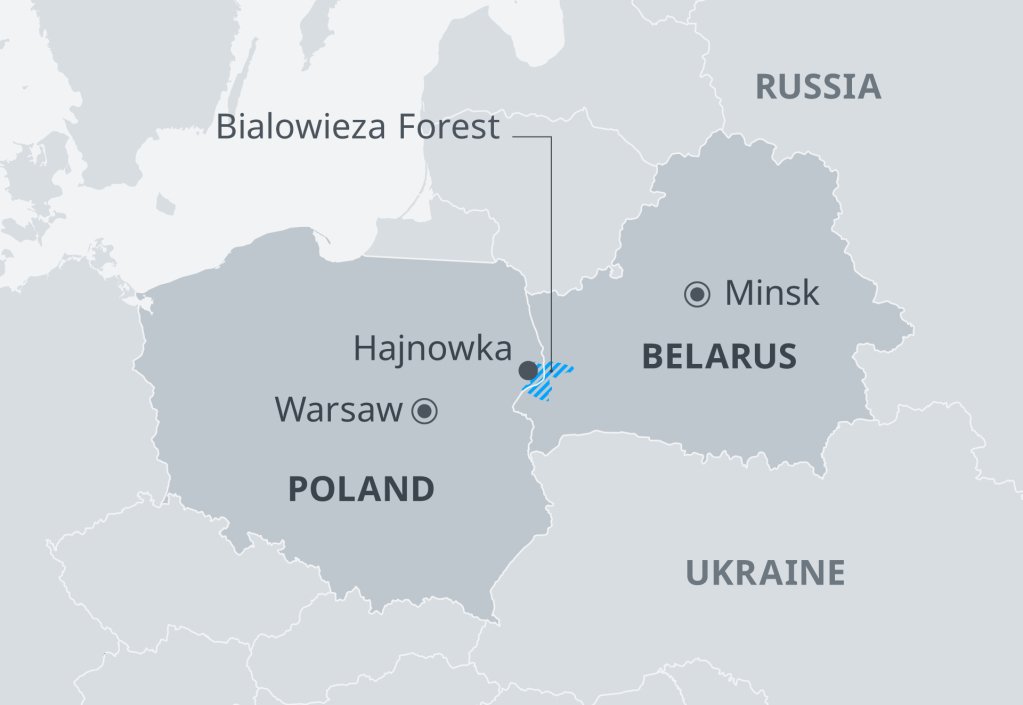
However, reaching the border brought no safety.
"The Belarus border wall is small, but if you touch it, the guards will know. The smuggler used a car jack to open it for us, but we were caught by Belarusian soldiers. That day was the worst day of my life. They beat us, and let a dog chase us. It was a very bad situation."
In the end, the soldiers told the group they couldn’t return to Belarus and had to go straight to Poland. They gave back the car jack before sending them away.
The group spent 12 days in the forest, between Poland and Belarus. "I saw two dead bodies – one in a plastic bag. I was traumatized. The stench, the swollen bodies… it was too much," Mohamed tells InfoMigrants.
Rights groups have documented similar testimonies. The report by Egala and Oxfam titled "Brutal Barriers," published in mid-March, states that people allegedly face dog bites, pepper spray, beatings and even torture at the hands of Belarusian border guards.
"We have many testimonies of migrants being bitten by dogs – this is alarmingly common," says Aleksandra Gulińska, Egala Advocacy Lead.
Reactions from Polish authorities
InfoMigrants asked the Belarusian authorities for a response but received no reply. The Polish authorities, however, issued a detailed statement addressing the report’s findings.
The Ministry of the Interior and Administration said it had taken note of the contents of the Oxfam/EGALA report. A spokesperson claimed that the evidence presented "confirms that migration through Belarus is instrumentalized and supported by the state structures of Russia and Belarus."
They stressed that these governments facilitate legal travel to Belarus -- for example, by issuing Russian visas -- and then support Belarusian services in attempts to illegally cross the Polish border.
The spokesperson further argued that these attempts, which they claimed the report failed to mention, "in the vast majority of cases involve the use of violence, primarily physical attacks on Polish officers and border infrastructure."
In light of this, the spokesperson concluded that "the measures taken by the Polish Government, including those to protect the external border of the European Union, aimed at countering a hybrid attack weaponizing migration, should be assessed as proportionate and justified."
An attempt to destabilize the EU
In response to allegations of systemic pushbacks and violence by Polish border forces, the Polish government defended its actions as necessary for protecting national security and the EU’s external border. A spokesperson stated that “migration is being instrumentalized by the Russian and Belarusian regimes to destabilize bordering EU states.”
They argued that the current migration pressure on the Belarusian border is "artificially created" through the facilitation of tourist visas to people from high-risk countries, mainly in the Middle East and Africa, and by aiding their recruitment via various intermediaries. Many migrants, they added, pay criminal networks for transit into Europe and often destroy their documents, complicating asylum procedures and making returns unfeasible.
In response to concerns about the treatment of migrants, the spokesperson added that "in the scope of preventive actions, the subject of human rights protection and the guidelines in force in this area -- including the adequacy of the use of direct coercion -- are regularly discussed at management briefings and meetings of human rights coordinators from the Podlaskie Border Guard Unit (POSG), and communicated through official letters accessible to all POSG officers."
According to the government, most migrants try to avoid contact with Polish authorities and continue traveling illegally to other EU countries. They claimed that Belarus aims to provoke “critical security incidents involving migrants” to further destabilize the EU.
Blurred lines
For many migrants, it is often not clear who might be perpetrating violence towards them and from which country they might come.
Psychologist Maria Ksiazak, who works with the International Humanitarian Initiative Foundation (IHIF), and was approached by InfoMigrants with the findings of the Oxfam/EGALA report as well as the independent testimony, explained that most of the migrants she sees in therapy report being victims of torture or receiving severe inhuman treatment -- whether in their home countries, in Belarus, or even at the hands of Polish border guards. "Many arrive after surviving repeated pushbacks and violence. Some report being beaten, denied urgent medical care, or subjected to degrading treatment by border forces," she says.
InfoMigrants previously reported several accounts by migrants describing violence, pushbacks, having their possessions taken and phones destroyed.
One migrant, who did not provide a name told InfoMigrants that they were trapped in the forest for weeks "if we decided to move away from the borders and head towards the inner cities, the border guards would chase us and call us his dogs, we were stuck between the two sides for 45 days, the days are very long in the woods."
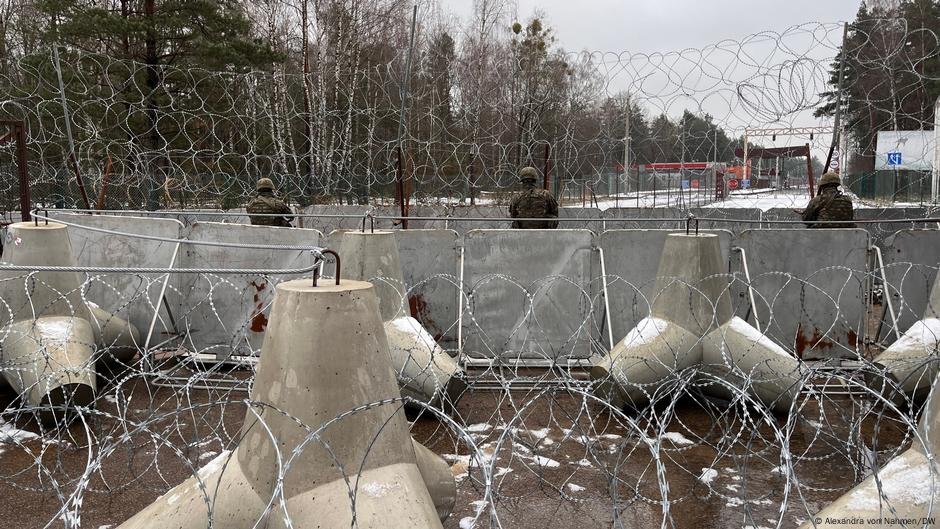
Another migrant named Ahmed also detailed how Belarusian border guards used them as forced labor. "On the Belarusian side, we were arrested by the border guards, and they treated us like slaves, they ordered us to cut wood and set them on fire, the humiliation that the immigrants experienced there could not be described before they transported us (the Belarusian border guards) to the 'forbidden area'. And they explain to us that we must go to Poland, and not try to return again to Belarus."
Gulinska describes how migrants are also subject to deadly pushbacks. "Several people have died from being pushed into rivers. Many can’t swim, and crossing a wild river in the middle of winter is incredibly dangerous."
As a result, many drown or die due to hypothermia. Sometimes, bodies are found by activists, locals, tourists, or even border guards. Other times, they are never found at all, says Gulinska.
InfoMigrants confronted the Belarusian authorities with reports about violence against migrants by border guard agents, but did not receive a reply by the time of publication.
Read AlsoA cat-and-mouse game: How migrants and smugglers adapt to AI border technology
A shrinking humanitarian space
On the Polish side, there are also countless allegations of violence. "We see abuse, direct coercion, the use of pepper spray, brutal strip searches, destruction of belongings like phones and clothes, and beatings during pushbacks," Gulińska explains.
Mohamed describes the violence at the Polish border he experienced. After entering through a hole in the fence made by a smuggler using a car jack, they then had to use a ladder to cross the second barrier. When they reached the ground on the other side the smuggler told them to run as fast as they could.
"We were trying to escape as fast as we could, but the soldiers came. It was nighttime. They caught us and started beating us. I’ve never been beaten like that before – never. Three soldiers were on me, and one of them pressed his knee into my shoulders while the others hit me in the face and all over my body. They were beating me so hard," he claims.
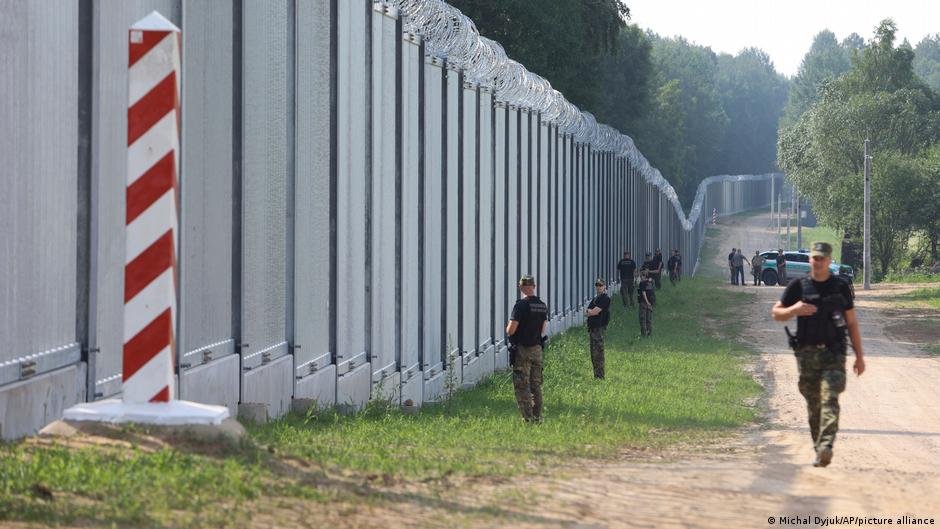
Mohamed’s story also points to the use of pepper spray. "In the end, they sprayed something on me – I don’t know what it was, but the pain was unbearable. I would have preferred being beaten. It burned my face and hands like fire," he says.
"They pushed us back to the area between the wall and Belarus. I was burning for two days. Washing made it worse. Even now, heat makes my hands turn red and itch. Someone said the spray was used to scare off bears. I don’t know why they used it on us."
Due to his poor physical state following the beatings and the pepper spray he stayed in the forest for five more days before making another attempt.
Kalina Czwarnóg, a spokesperson for the Warsaw-based Ocalenie Foundation, which provides administrative, legal and psychological support to migrants and refugees, describes how the violence has become not just physical but deeply humiliating. She shares an account from one of the many incidents of harassment described by migrants.
"For example, a group of migrants came to the border fence. They asked the guards for water and food. The soldiers said, 'Dance for us first.' They danced. The guards laughed, filmed them, and gave them nothing."
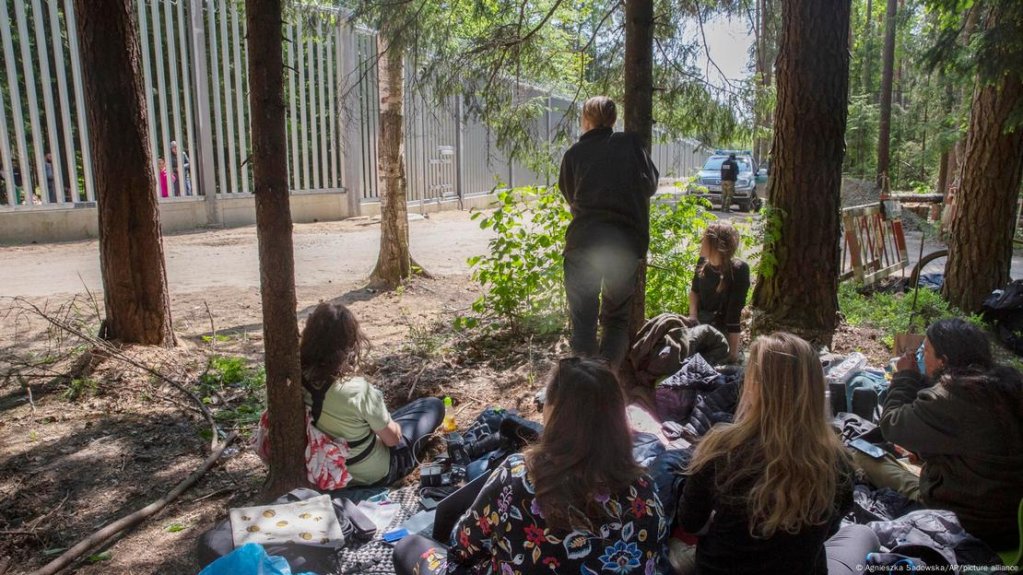
The problem, she notes, is compounded by the absence of oversight regarding the use of force. "Even when it comes to the use of weapons or force against migrants, there’s hardly any real accountability – nothing stopping them from behaving however they want, really," Czwarnóg says.
Speaking to InfoMigrants, a Polish government spokesperson responded to allegations of systemic pushbacks and violence by Polish border forces, by stating that Poland "is taking action that is necessary to ensure the protection of the state border, which is also the external border of the European Union." The spokesperson also claimed that most attempts to cross the Polish border involve violence, including physical attacks on officers and damage to border infrastructure.
The spokesperson also stressed that border operations are subject to oversight, noting that each Border Guard branch includes a Human Rights Protection Officer "responsible for initiating, monitoring and coordinating activities to ensure respect for human dignity and observance of human rights." Training in human rights and the use of force is reportedly continuous and mandatory throughout a border guard’s career.
Legislation to suspend asylum rights
In early 2025, Poland enacted legislation permitting the temporary suspension of asylum rights along its eastern border, allowing border guards to summarily expel individuals without processing their claims.
The law, which came into effect on March 27 and was extended on May 21, includes formal exceptions for vulnerable individuals such as minors, pregnant women, and those with health issues. However, in practice, even these groups remain subject to pushbacks, say humanitarian groups.
"We are deeply concerned about the treatment of vulnerable people. There are no proper processes in place to identify them," says Sarah Redd, Oxfam Ukraine Advocacy Lead. The lack of formal procedures means that those who qualify as vulnerable under the law – including children, the sick, and pregnant women – are often also denied their rights.
"It’s left to border guards to decide whether someone is 'vulnerable' – whether they’re under 18, pregnant, or physically ill – without any formal assessment. And even when these people clearly qualify, they’re still being pushed back," claims Redd.
She adds that, just in the past three weeks, humanitarian workers at the border became aware of a case where an individual receiving hospital treatment was still subjected to a pushback.
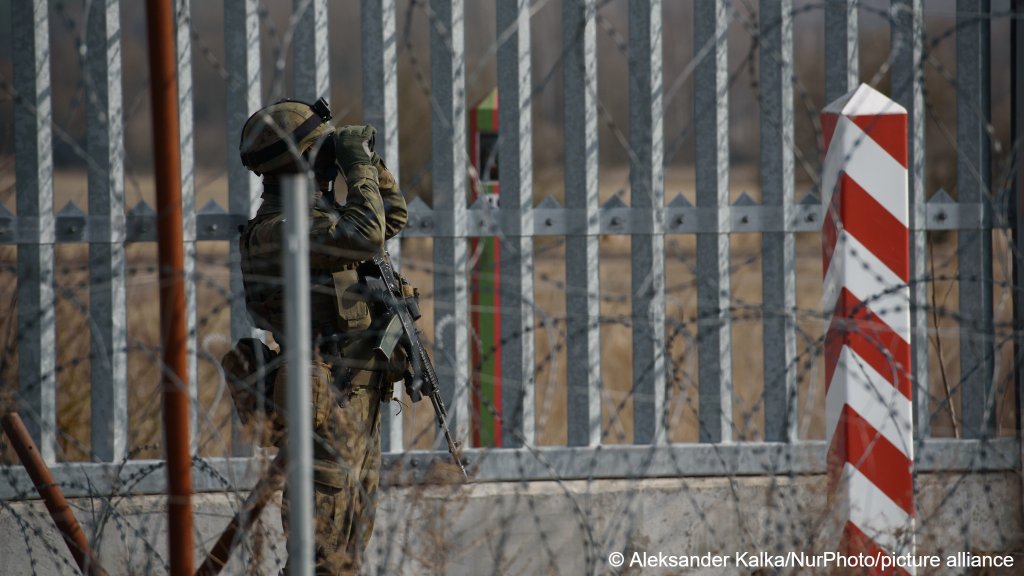
The Polish government contends that "persons from vulnerable groups are excluded from the temporary restriction of the right to submit an application for international protection," and notes that "training for officers in the field of fundamental rights and respect for human rights is also carried out on an ongoing basis" by both internal and international partners. According to the Border Guard Headquarters, each branch includes a Human Rights Protection Officer, tasked with overseeing compliance with human rights obligations and initiating actions in the event of violations.
Redd warns that the absence of proper documentation or accountability creates an environment where abuse can potentially flourish without consequence.
"There’s no paper trail. No official procedure. No requirement to document these decisions. So there's no way to appeal, no accountability," she says.
Asked about reports that some individuals are being denied access to asylum procedures, a Polish government spokesperson said: "Polish services are on guard and do not allow anyone to cross the Polish-Belarusian border in violation of the regulations." They added that "the right to international protection is used as a skeleton key to get into the Schengen area," and claimed that "the vast majority of [migrants] do not want to submit applications for international protection in our country… they prefer to try in richer countries, such as Germany."
A spokesperson for the European Commission told InfoMigrants that "the EU will not tolerate any attempts by Russia or Belarus or any other country to use EU values against the Union, including the right to asylum, for political purposes."
Adding that this is why "in December last year, the Commission adopted a Communication providing the legal context in which exceptional measures to tackle this threat can be taken."
Read AlsoOver 120,000 migrant pushbacks recorded at EU borders in 2024, say NGOs
Silence, shame, and invisible wounds
The Oxfam/EGALA report also includes several testimonies of sexual violence. These cases are made all the more difficult to track due to stigma and fear, and the challenging circumstances in which the testimonies are collected.
"At EGALA, we’re documenting a high volume of these accounts," says Gulińska. But it’s impossible to fully understand the scope of sexual violence, because so much goes unreported. Victims often stay silent–out of fear, shame, or trauma."
InfoMigrants was unable to independently verify this kind of testimony. Sexual violence is one of the most difficult forms of abuse to document at the border. Though it comes up less frequently than physical violence in interviews with migrants, humanitarian workers stress that this doesn’t necessarily mean it’s uncommon."We’re not sure if this is due to it being less common or if it’s too taboo for victims to speak about. That makes it difficult to measure," Gulińska says.
Ksiazak has also heard first-hand accounts of rape and sexual abuse during border crossings -- including against women, men, and unaccompanied minors. "Many of these cases meet the UN's definition of torture, as they are committed or condoned by border authorities," she explains, particularly in Belarus. "The silence around these violations is fueled by fear, shame, and a lack of safe spaces to disclose trauma."
The conditions for disclosing such experiences are far from ideal. Encounters between NGOs and migrants often happen at night, in the rain or cold, under the threat of discovery by border guards. A number of rights groups InfoMigrants spoke to all pointed out that these are not the environments that make people feel safe enough to share deeply personal trauma, not during chaotic border interventions. In contrast to physical injuries -- which demand immediate medical attention and are more visible -- sexual violence tends to surface only later, often in hospitals.
"Several times, we have provided medical and psychological support to girls who experienced rape on the Belarusian side. It may be underreported rather than uncommon, but it’s difficult to know," says Gulinksa.
In addition, she tells InfoMigrants that aid workers often meet women traveling in male-dominated groups -- sometimes just one woman among five or six men -- further complicating the possibility of disclosure.
One group of women told EGALA they slept in shifts to avoid encounters with smugglers and border guards. Especially young girls from Somalia and Eritrea, who were alone and were highly vulnerable to trafficking -- a threat that NGOs have limited capacity to even detect.
Read AlsoWhere are you? Missing between Belarus and Poland
Editor's Note:
Additional reporting by Moussa Abuzanoona.
The Belarusian border authorities did not respond to a request for comment at the time of publishing.
Due to the dangerous conditions and political sensitivities surrounding the Belarus–Poland border, some individuals and identifying details have been withheld to protect their identity.
